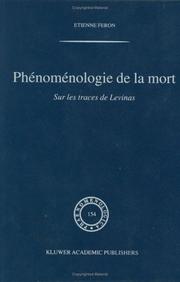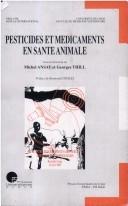| Listing 1 - 2 of 2 |
Sort by
|

ISBN: 0792359356 9780792359357 Year: 1999 Volume: 154 Publisher: Dordrecht: Kluwer Academic Publishers,
Abstract | Keywords | Export | Availability | Bookmark
 Loading...
Loading...Choose an application
- Reference Manager
- EndNote
- RefWorks (Direct export to RefWorks)
Inspired by Levinas, but in constant dialogue with Heidegger, Feron considers death to be a phenomenon that lies within the reach of phenomenology. The act of the other's death is essentially a decease, a break affecting the identity. It forces man to consider the fundamental intersubjectivity inscribed in his temporality. Viewed in this way, death does not look merely like the term of life coming to an end. Nor is it a passage to `somewhere beyond'. Rather, it lies at the core of the act of relationship.In its search in the space between sense and non-sense, this phenomenology of death reveals the fundamentally relational dimension of the humane and sketches the main features of this paradoxical `intersubjectivity': the position of third party that is taken by man, the calling of son that he has been selected for and - midway between passivity (Levinas) and possibility (Heidegger) - the condition of `liability' to which he is dedicated and of which he is also worthy.
Dood --- Fenomenologie --- Levinas, Emmanuel --- Mort --- Phénoménologie --- Lévinas, Emmanuel --- Contributions in concept of death --- -Lévinas, E. --- Leṿinas, ʻImanuʼel --- Levinas, Emani︠u︡el --- לוינס׳ עמנואל --- לוינס, עמנואל --- -Levinas, Emmanuel --- -Contributions in concept of death --- Phénoménologie --- Lévinas, Emmanuel --- Death --- Dying --- End of life --- Life --- Terminal care --- Terminally ill --- Thanatology --- History --- Philosophy --- Lévinas, Emmanuel. --- Philosophical anthropology --- Metaphysics --- Lévinas, Emmanuel. --- Death. --- Phenomenology --- Lévinas, E. --- 20th century --- Contributions in concept of death. --- Līfīnās, Īmānwāl --- ليفيناس، إيمانوال --- Death - History - 20th century. --- Levinas, emmanuel (1906-1995) --- Philosophie

ISBN: 2870371705 9782870371701 Year: 1990 Volume: 3 Fasc. 74 Publisher: Namur: Facultés universitaires Notre-Dame de la Paix. Société des études classiques,
Abstract | Keywords | Export | Availability | Bookmark
 Loading...
Loading...Choose an application
- Reference Manager
- EndNote
- RefWorks (Direct export to RefWorks)
Bereavement in literature --- Death in literature --- Dood --- Dood in de literatuur --- Mort --- Mort dans la littérature --- Sterfte in de literatuur --- Death --- Religious aspects --- Catholic Church --- Aspect religieux --- Eglise catholique --- John Chrysostom, --- Christianity --- History of doctrines --- -Death --- Dying --- End of life --- Life --- Terminal care --- Terminally ill --- Thanatology --- -Christianity --- -History of doctrrines --- -Religious aspects --- -History --- Philosophy --- John Chrysostom Saint --- -Contributions in concept of death --- Aranyszájú, János, --- Chrysostom, John, --- Chrysostomo, João, --- Chrysostomos, Iō. --- Chrysostomos, Johannes, --- Chrysostomus, Joannes, --- Crisostomo, Giovanni, --- Crisostomo, Juan, --- Crisostomus, Ioannes, --- Giovanni Boccadoro, --- Giovanni Crisostomo, --- Hōhan Oskiaban, --- Hovhan Oskeberan, --- Hovhannēs Oskeberan, --- Iō. --- Ioan Gură de Aur, --- Ioan Zlatoust, --- Ioann Zlatoust, --- Ioannes Crisostomus, --- Iōannēs ho Chrysostomos, --- Ivan Zolotoustyĭ, --- Jan Chryzostom, --- Ján Zlatoústy, --- Jean Bouche d'Or, --- Jean Chrysostome, --- Jehan Bouche d'Or, --- Joan Gojarti, --- Joannes Chrysostomus, --- Joannes Crisostomus, --- João Chrysostomo, --- Johannes Chrysostomus, --- Johannes Goldmund, --- John, --- Jovan Zlatoust, --- Juan Crisóstomo, --- Pseudo-Chrysostome, --- Pseudochrysostomus, --- Yoḥanes ʼAfa Warq, --- Yūḥannā al-Dhahabī al-Fam, --- Yūḥannā al-Fam al-Dhahabī, --- Yūḥannā Fam al-Dhahab, --- Zlatoust, Ioan, --- Zlatoust, Jovan, --- Zlatoústy, Ján, --- Ἰωάννης, --- Іван Золотоустий, --- يوحنا الذهبي الفم --- يوحنا فم الذهب، --- John Chrysostom --- Style [Literary ] --- Catholic Church. --- Death - Religious aspects - Christianity - History of doctrines - Early church, ca. 30-600. --- Jean Chrysostome, saint --- Jean chrysostome (saint), docteur de l'eglise, 349?-407 --- Critique et interpretation
| Listing 1 - 2 of 2 |
Sort by
|

 Search
Search Feedback
Feedback About UniCat
About UniCat  Help
Help News
News